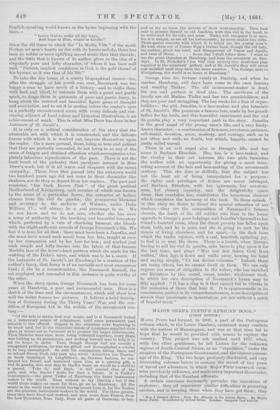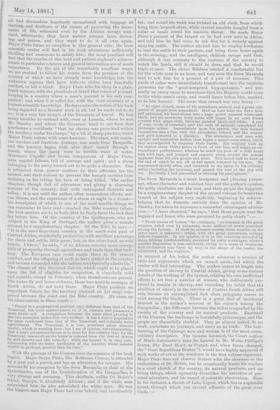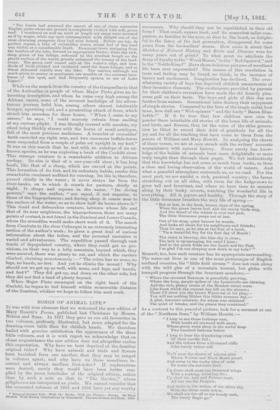MAJOR SERPA PINTO'S AFRICAN BOOK.* [FIRST NOTICE.]
MAJOR PINTO had formed, in 1869, a part of the Portuguese column which, in the Lower Zambesi, sustained many conflicts with the natives of Massangano, and was at that time led to hope that he would be provided with means to explore the country. This project was not realised until 1877, when, with two other gentlemen, he left Lisbon for the unknown regions of South-Central Africa, as an " expedition," under the auspices of the Portuguese Government, and the express patron- age of the King. The two large, profusely illustrated, and very interesting volumes before us contain the record of two years of travel and adventure, in which Major Pinto traversed coun- tries previously unknown, and made many important discoveries, including that of the Zambesi affluents.
A certain sameness necessarily pervades the narratives of explorers ; they all experience similar difficulties in procuring carriers, and in keeping them when they have got them ; they
* How I Crossed Africa from the Atlantic to the Indian Ocean. By Major Serpa Pinto. Translated by Alfred Elves. London : Sampson Low and Co.
all find themselves hopelessly encumbered with baggage at starting, and destitute of the means of procuring the neces- saries of life, estimated even by the African savage stan- dard, afterwards; they have narrow escapes from drown- ing and poison, and they want to do it all over again. Major Pinto forms no exception to this general rule ; the least scientific reader will find in his book adventures sufficiently thrilling and numerous to satisfy him ; the most practical will had that the results of this bold and patient explorer's achieve- ments to particular sciences and general information are of much importance. By the aid of the remarkably excellent maps, we are enabled to follow his course from the portions of the country of which we have already some knowledge, into the unknown regions that have hitherto either been fancifully marked, or left a blank. Major Pinto tells his story in a plain, frank manner, with the plenitude of detail that comes of journal- keeping in a country where a man's journal is his only com- panion; and when it is called for, with the close accuracy of a trained scientific knowledge. He deprecates the notion of his book being regarded as a literary work at all, but he needs not to do so ; it is a very fair sample of the literature of travel, He had many troubles to contend with, even at Loanda, where ho met Mr. Stanley, and where the Governor tried to get from that gentleman a certificate " that no slavery was permitted within the territory under his charge," by a bit of sharp practice, which Major Pinto relates with some humour. The start, with mutin- ous carriers and fractious donkeys, was made from Benguella,
and the journey began with nine days' march through a desert, where the party were in terrible want of water.
Messieurs Capello and Ivens, companions of Major Pinto, were capital fellows, full of courage and spirit ; and a sheep belonging to the party turned out to be quite a character. Oue is attracted from graver matters by their affection for the animal, and their devices to prevent the hungry carriers from insisting on his taking his. turn of being killed.. The earlier chapters, though full of adventure, and giving a charming account of the country, deal with subjugated districts and
tribes ; it is not until the author, after tremendous efforts, seri- ous illness, and the experience of a storm at night in a forest—
his description of which is one of the most terrible things we can remember to have read—reached the Bih6 country (where the best carriers are to be had), that he fairly faced the task that lay before him. Of the country of the Quillengues, who are subject to the King of Portugal, the author gives a minute account in a supplementary chapter. Of the 13ilni, he says :- " It is the most important country in the south-west part of Central Africa, wonderfully productive, with excellent pasturage for sheep and cattle, little game, but, on the other hand, no wild beasts. I know," lie adds, " of no African country more suscep- tible of prosperity through agriculture and trade than that terri- tory. The European race could reside there in the utmost comfort, and the offspring of such as have settled in the country and become connected with the natives are physically admirable."
The climate of this favoured district, which ought to be placed upon the list of eligibles for emigration, is singularly mild and equable, except in February, when thunderstorms prevail. The tsetse-fly and horse-sickness, those two terrible scourges of South Africa, do not exist them Major Pinto predicts an important future for the territory (defined on his map) com- prised between the coast and the Bih6 country. He Kilns up his observations in these words :—
" Placed in a geographical position very different from that of the Transvaal, this tract approximates to it in climate, and possesses a more fertile soil. A comparison between the same plant growing in the two countries makes this very evident. It has a native population far more condensed than that of the Transvaal, and infinitely more agricultural. The Transvaal, it is true, possesses great mineral wealth, which is wanting hero ; but 1 am of opinion, notwithstanding, that a moro prosperous future is in store for this country than for the Transvaal, inasmuch as the latter is isolated from the rest of Africa by arid deserts and the teise-fly ; while the former is in easy com- munication with the other territories of the interior, whose natural wealth is, perhaps, greater than its own."
With the passage of the Cuanza river the romance of the book begins. Major Serpa Pinto, like Robinson Crnsoe, is attended by a goat and a parrot, and has an attraction for savages. His account tf his reception by the Soya Mavanda; or chief of the Quimbandes, one of the Confederation of the Ganguellas, is very strange and amusing. This chieftain, unlike Dr. Holub's friend, Sopopo, is absolutely African ; and if the white man
astonished him, he also astonished the white man. Ho was the biggest man Major Pinto had ever beheld, and inordinately
fat; and round his waist was twisted an old. cloth, from which.
hung three leopard-skins, while several amulets dangled from to collar of beads round his massive throat. He made Major Pinto a present of the largest ox he had ever seen in Africa,. and told him he had conic to ask him for a remedy against straying cattle. The author advised him to employ herdsmen to lead the cattle to their pasture, and bring them home again in the evening; and the intelligent, childish savage said that, although it was contrary to the customs of the country to watch the herds, still it should be done, and that he would begin at once. The clever BilAnos erected a comfortable hut for the white man in an hour, and very soon the Soya Mavanda sent to ask him for a present of a pair of trousers. Five yards of calico were immediately transformed into the requisite garments for the " good-tempered hippopotamus," and pre- sently an envoy came to announce that his Majesty would come. to the white man's camp, and would dance before him, masked, to do him honour. The scene that ensued was very funny :—
" At eight o'clock, some of his attendants arrived, and a great con- course of people soon assembled. Half an hour later the Soya him- self appeared, his head thrust into a huge gourd painted white-and- black, and his enormous body made still larger by on osier frame covered with grass cloth, likewise painted black-and-white. A. sort of coat, made of horsehair and the tails of animals, completed his grotesque attire. Immediately upon his arrival, the men formed themselves into a line, with the attendants behind, and the women and girls removed to a distance. The attendants and men, with upright and motionless bodies, then began a monotonous chant, which they accompanied by clapping their hands. His majesty took up his station about thirty paces in front of the line, and began an ex- traordinary performance, wherein he acted the part of a wild beast torn with rage, and jumped and capered about, amidst the utmost applause from his own people and mine. This lusted half an hour, at the end of which ho ran off at full speed, followed by his men. Ho reappeared shortly after, and returned to my camp in his ordinary attire (including the trousers), and passed the rest of the day with me. Decidedly I had succeeded in winning his good graces."
The Soya Mavanda is a most benignant and pleasing person- age, whose character and conduct bear out the author's opinion., the petty chieftains are the best, and their people the happiest. In a supplementary chapter of the second volume he treats this branch of his subject very explicitly, beginning by acknow- ledging that he dissents entirely from the opinion of Mr. Stanley, for whom he expresses a somewhat extravagant admira.
tion :—" I have observed," he says," that those people were the happiest and freest who wore governed by petty chiefs "
Those scenes of horror," he continues, "so common in the great empires ruled over by autocrats, were seldom or never practised among the former. If theft be common among them, murder, on the other hand, is unknown ; whilst, with the great potentates, robbery follows homicide. In my opinion, it is in the countries occupied by those African confederations, governed by petty sovereigns, where a. warlike disposition is less cultivated, owing to a sense of weaknese, that civilisation may force its way, in the shape of the trader, the missionary, and the explorer."
in support of his belief, the author advances a number of facts and arguments which we cannot quote, but which the reader will find interesting. The author enters at length into
the question of slavery in Central Africa, giving seine curious details of the working of the system, relating his own ineffectual efforts to set free a number of women, who deliberately pre- ferred to remain in slavery, and recording his belief that the abolition of slavery in the interior of Central South Africa will only become an accomplished fact when polygamy ceases to exist among the blacks. There is a great deal of incidental.
interest in the author's account of his sojourn among the G.anguellas ; the difference between the tribes is equalled by the variety of the country and its natural products. Eastward of the Cuanza, the landscape is beautifully picturesque, and the people are shamefully slothful. They go almost naked, do no work, undertake no journeys, and carry on no trade. The hair-
dressing of the Cubango men and women is of the most extra- ordinary description. The famous Leonard, the Court coilifeur of Marie Antoinette's time (lie figured in Mr. Watts Phillips's drama, The Dead Heart, as Toupet, and, when times changed,.
the " Good Republican Brutus "), would have highly approved of such works of art as the woodcuts in the first volume represent..
Major Pinto does not observe Nature with the closeness or the enthusiasm of Dr. Holub, but lie occasionally treats his readers to a vivid sketch of the country, its natural products, and its living things, which agreeably diversifies his narrative of per- sonal adventure, and his record of scientific observation. Hero. is, for instance, a sketch of Lake Liguri, which lies iu a splendid forest, through which run several affluents of the great river Onda
" The forest bad assumed the aspect of one of those extensive English parks whore the ground is completely clothed with soft, green turf. I wandered on and on, until at length my steps were arrested as if by magic, while my eyes contemplated with delight one of tho most charming prospects they had ever behold. Before me lay, iu perfect repose, a lake of crystalline water, whose bed of fine sand was visible at a considerable depth. Enormous trees, springing from the borders of the lake, formed an appropriate frame; white the rich, deep green of the foliage, reflected to the smallest bough on the placid surface of the water, greatly enhanced the beauty of the land- scape. The green turf ceased only at the water's edge, and hun- dreds of birds chirped and twittered amid the dense foliage, and at times skimmed rapidly over the lake. The natives, although not much given to poetry or sentiment, are sensible of the extreme love- liness of this spot, and had frequently spoken to me of Lake
Liguri." •
While on the march from the country of the Ganguollas to that of the Ambuellas (a people of whom Major Pinto gives an in- teresting description, and whom he rates very high among the African races), some of the severest hardships of his adven- turous journey bofel him, among others almost intolerable hunger, agonising cold, and a prostrating attack of fever, which struck him senseless for three hours. " When I came to my senses," he says, " t could scarcely refrain from, smiling at my curious plight. I was literally covered with amulets, my chest being thickly strewn with the horns of small antelopes, full of the most precious medicines. A bracelet of crocodiles' teeth encircled my right arm, and two enormous buffalo-horns were suspended from a couple of poles set upright in my tent." It was on this march that he met with an antelope of an un- known species, as he was exploring a bank of the Cuchibi river.
This strange creature is a remarkable addition to African zoology. Its size is that of a one-year-old steer ; it has long hoofs, like that of a sheep, which are curved at the points. This formation of its feet, and its sedentary habits, render this remarkable ruminant unfitted for running. Its life is, therefore, passed chiefly in the water ; it never strays far from the river-banks, on to which it crawls for pasture, chiefly at night. It sleeps and reposes in the water. " Its diving powers," says the author, " are equal, if not superior, to those of the hippopotamus ; and during sleep it comes near to the surface of the water, so as to show half its horns above it." This timid and defenceless creature, between whose life and that of its near neighbour, the hippopotamus, there are many points of contact, is not found in the Zambesi and Lower C uando, where the crocodiles would make short work of it. The march from Combats. to the river Oubangui is an extremely interesting section of the author's work ; he gives a great deal of curious information about the tribes, and the personal narrative is varied and adventurous. The expedition passed through vast tracts of depopulated country, where they could get no pro- visions, on their way to a lofty mountain, beyond which, they were assured, there was plenty to eat, and which the carriers climbed, chanting monotonously :—" The cobra has no arms, no legs, no hands, no feet. And yet he climbs the mount ! Why should not we get up as well, with arms, and legs, and hands, and feet P" They did get up, and down on the other side, but they did not find a land of plenty beyond.
When Major Pinto encamped on the right bank of the Crichibi, ho began to feel himself within measurable distance of the Zambesi, whither we hope to follow him next week.








































 Previous page
Previous page